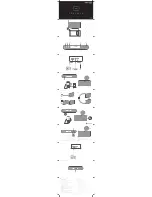
7
English |
Original instructions
Even when you use a generator correctly, CO may leak into
the home. Always use a battery-powered or battery-backup
CO alarm in the home.
If you start to feel sick, dizzy, or weak after the generator
has been running, move to fresh air immediately. See a
doctor.
You could have carbon monoxide poisoning.
WARNING
Do not allow familiarity with products to make you
careless. Remember that a careless fraction of a second
is sufficient to inflict serious injury.
WARNING
Do not use any attachments or accessories not
recommended by the manufacturer of the product. The
use of attachments or accessories not recommended
can result in serious personal injury.
APPLICATIONS
This generator is designed to supply electrical power for
operating compatible electrical lighting, appliances, tools,
and motor loads.
BEFORE OPERATING THE PRODUCT
■
Only use outdoors and far away from windows, doors,
and vents.
■
Never use inside a home or garage, even if the doors
and windows are open.
■
Always position the generator on a flat firm surface.
■
Check engine lubricant level and fill, if necessary.
Refer to the "Checking/adding lubricant" section in this
manual.
■
Check fuel level and fill, if necessary. Refer to the
"Checking/adding fuel" section in this manual.
CAUTION
Attempting to start the engine before it has been properly
filled with oil will result in equipment failure.
SPECIAL REQUIREMENTS
Please consult a qualified electrician, electrical inspector,
or the local agency having jurisdiction:
■
In some areas, generators are required to be registered
with local utility companies.
■
If the generator is used at a constuction site, there may
be additional regulations which must be obsereved.
USB CHARGING OUTLETS
The USB outlets will charge most USB-compatible devices.
■
For MP3, cellphones, and other small USB devices (up
to 1.9 A), connect to the top USB port.
■
For tablets and high-charging current devices (up to 2.1
A), connect to the bottom USB port.
NOTE:
The USB oulets provides power only; it does not
provide any communication capabilities. A suitable USB
cable must be provided by the user.
CHECKING/ADDING LUBRICANT
See Figure 3.
CAUTION
Attempting to start the engine before it has been properly
filled with oil will result in equipment failure.
Engine lubricant has a major influence on engine
performance and service life. For general, all-temperature
use, SAE 10W-30 is recommended. Always use a 4-stroke
motor lubricant that meets or exceeds the requirements for
API service classification SJ.
NOTE:
Non-detergent or 2-stroke engine lubricants will
damage the engine and should not be used.
■
Place the engine choke/off selector knob in the "off"
position.
■
Place the main on/off switch in the "off" position.
■
Loosen the screws at the side of the engine cover.
Remove cover and set aside.
■
Unscrew the oil cap/dipstick and remove.
■
Wipe dipstick clean and re-seat in hole; do not re-
thread.
■
Remove dipstick again and check lubricant level.
Lubricant level should fall between the minimum and
maximum marks on the dipstick.
■
If level is low, add engine lubricant until the fluid level
rises between the minimum and maximum marks on the
dipstick.
■
Replace and secure the oil cap/dipstick.
USING FUEL STABILISER
Fuel gets old, oxidizes, and breaks down over time. Adding
a fuel stabilizer (not included) extends the usable life of fuel
and helps prevent deposits from forming that can clog the
fuel system. Follow fuel stabilizer manufacturer’s directions
for correct ratio of stabilizer to fuel.
■
Mix fuel stabilizer and fuel prior to filling the tank by
using an approved fuel container and shaking gently to
combine.
NOTE:
To control the amount of fuel stabilizer being
added to the engine, always mix fuel stabilizer with fuel
before fueling the tank rather than adding fuel stabilizer
directly into the generator’s fuel tank.
■
Replace and secure the fuel tank cap.
■
Start and run the engine for at least 5 minutes to allow
stabilizer to treat the entire fuel system.
Summary of Contents for RIG2000PCB
Page 1: ...RIG2000PCB ORIGINAL INSTRUCTIONS Digital Inverter Generator...
Page 4: ...Fig 7 Fig 3 Fig 4 Fig 5 Fig 6 Fig 2 19 11 10 9 20 19 16 18 28 29...
Page 5: ...Fig 9 Fig 9 Fig 8 Fig 10 Fig 11 Fig 12 Fig 13 4 23 22 21 20 24 25 26 18 24...
Page 6: ...Fig 14 Fig 15 27 5 21 21 21 21...
Page 7: ......
Page 21: ...WIRING DIAGRAM...
Page 22: ......
Page 23: ......










































